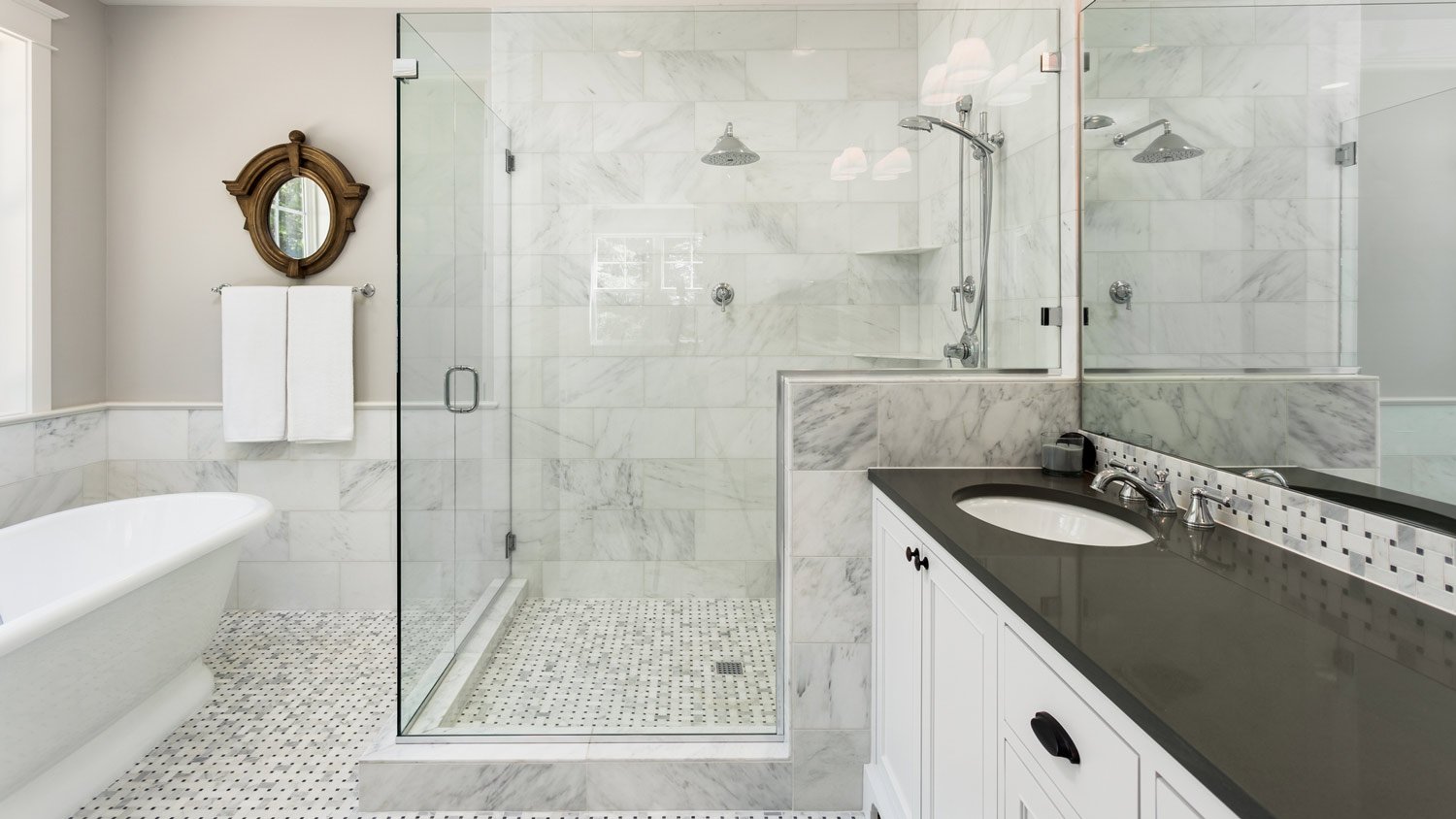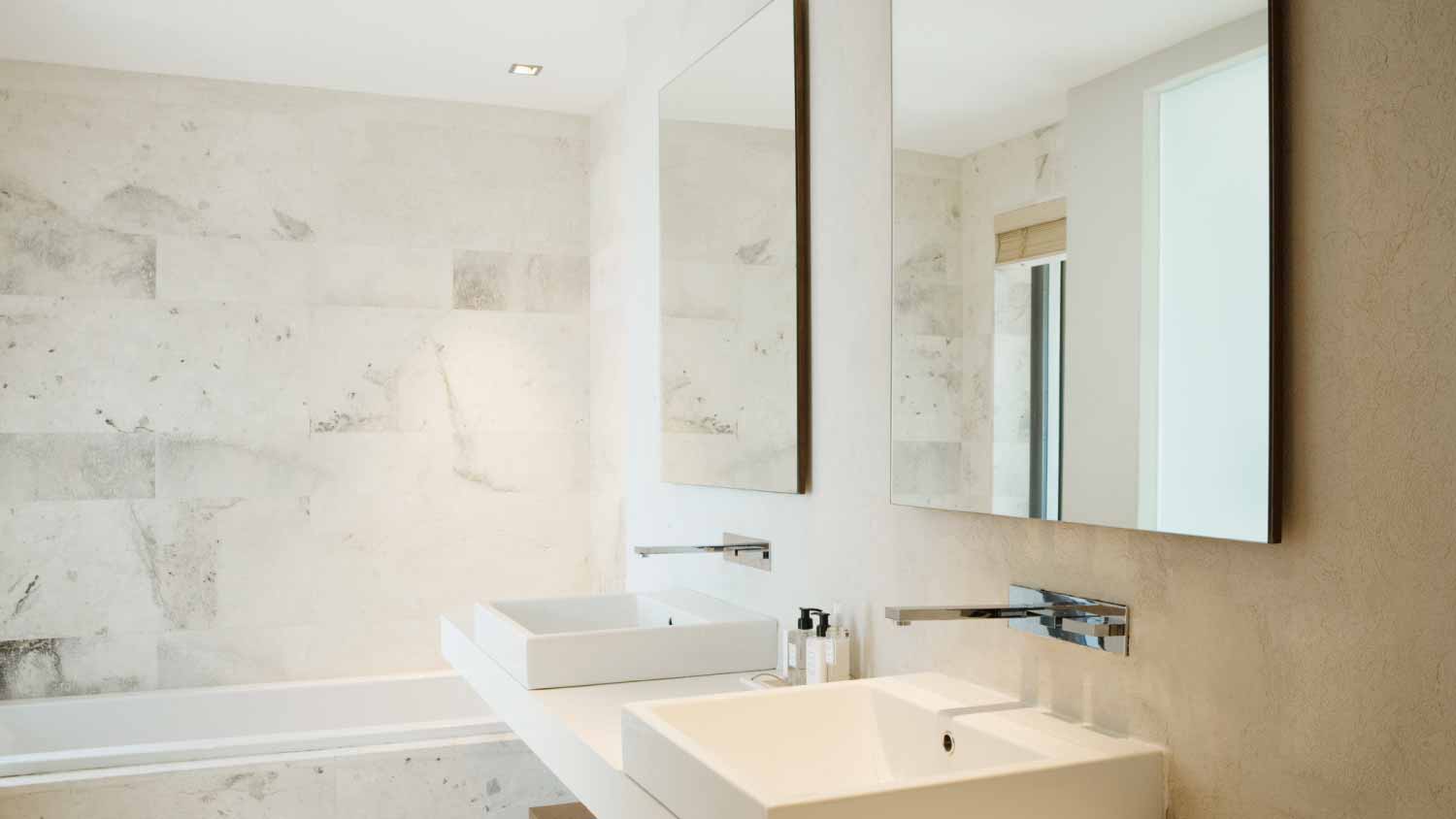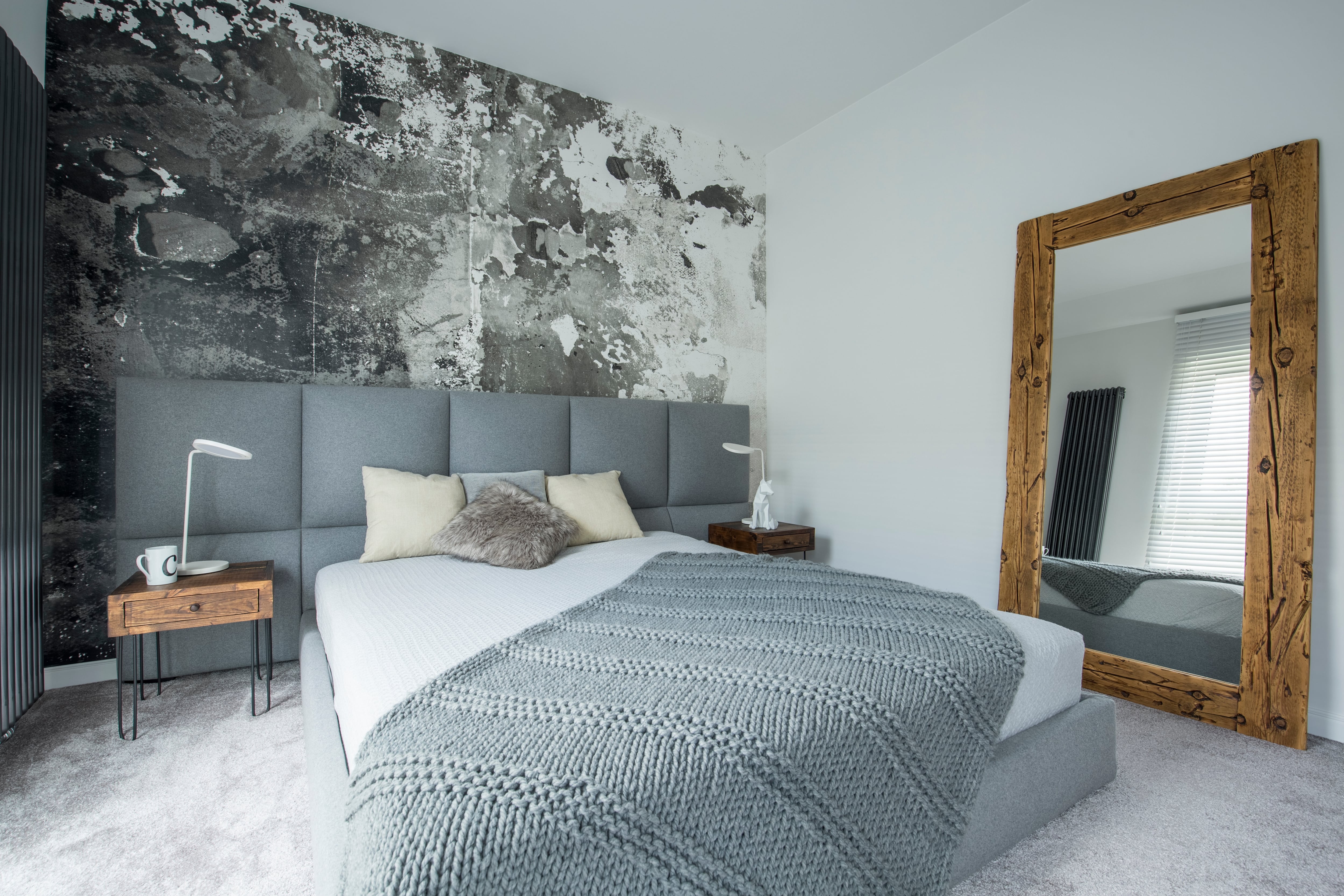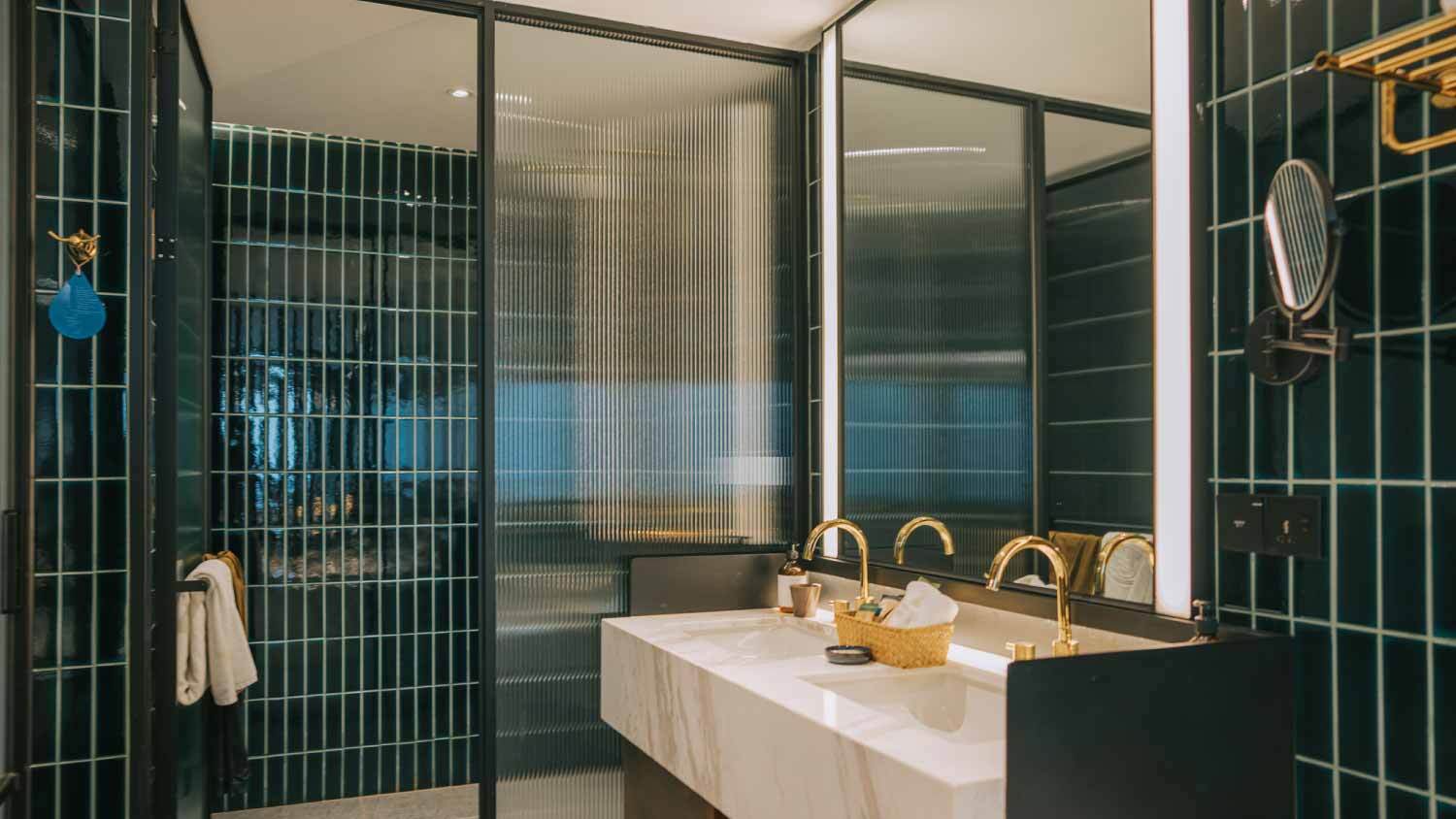
Whether you're remodeling a previously owned home to suit your tastes or updating your own previous renovations, removing mirrors glued to a wall can be an important part of personalizing your home to match your aesthetic.
Glass and mirror service costs depend on your project and location. Check with a local pro for your specific job.
Custom-cut mirrors are tailored to fit your space, adding value and style to your home.
Size, thickness, and edge finish are major cost drivers for the project.
Professional mirror installation costs $50 to $120 per hour, ensuring safety and quality results.
Custom mirrors can enhance light, space, and home value.
Budget for additional features like framing or lighting, which can increase costs by upwards of $600.
This article was created using automation technology and thoroughly fact-checked and edited by an Angi Editor in accordance with our AI policy.
The average cost of a custom-cut mirror is $500, with most homeowners paying between $200 and $2,500. Prices vary by mirror size, thickness, edge style, and installation needs. Expect to pay $10 to $50 per square foot for custom mirrors, plus labor and additional features.
Custom mirrors offer a tailored look and a perfect fit for any room. This guide explains what impacts your total cost, how labor and materials add up, and what to expect from start to finish.
The size of your custom-cut mirror is the single biggest factor affecting price. Larger mirrors require more material and can be more challenging to install, which increases both material and labor costs.
Mirror height and width directly affect the total price because custom mirrors are priced per square foot. Small accent mirrors cost less than large statement pieces, such as full wall or gym mirrors. Most shops can produce mirrors as small as one square foot or as large as 100 square feet or more, though very large mirrors often require custom handling or reinforced installation.
Accent mirrors, such as those used for vanities or decorative nooks, are on the lower end of the price spectrum. Large mirrors for gyms, dance studios, or wall-to-wall applications can be several times more expensive. Expect to pay $10 to $50 per square foot for most custom-cut mirrors, with specialty shapes or finishes adding to the cost.
| Mirror Size (Sq. Ft.) | Average Cost | Cost Range |
|---|---|---|
| 1–4 | $40 | $20–$200 |
| 5–15 | $200 | $100–$800 |
| 16–35 | $500 | $250–$1,400 |
| 36–100+ | $1,200 | $600–$4,000 |
Non-rectangular shapes—such as round, oval, or irregular designs—add to the custom cut mirror cost. Specialty shapes require custom templates, which may increase fabrication fees by $50 to $200 or more per mirror. Intricate cuts or unusual designs often require additional labor and specialized machinery, raising both material and mirror installation costs.
Style choices influence both the appearance and the price of your custom mirror. Your selection of frame, edge finish, and glass type can significantly impact costs.
Frameless mirrors are a popular, modern choice and tend to cost less than framed options. Framed custom mirrors use wood, metal, or composite surrounds, increasing the total price.
Edge finishes, such as beveled, polished, or seamed, also affect the look and cost. Specialty glass, including tinted, antiqued, or decorative, adds to the expense. Safety upgrades like shatterproof or tempered glass are more costly but offer added durability and peace of mind.
| Mirror Style/Type | Description |
|---|---|
| Frameless | No border, clean look |
| Framed | Wood, metal, or custom frame |
| Beveled edge | Angled edge creates dimension |
| Polished edge | Smooth, glossy edge |
| Seamed edge | Sanded edge, not shiny |
| Tinted/antiqued glass | Colored or aged appearance |
| Safety backing | Film or coating to prevent shattering |
| Tempered glass | Heat-treated for strength |

Upgrades such as integrated LED lighting, anti-fog technology, or smart features will increase the cost of your custom-cut mirror. Mounting hardware, such as specialty brackets or concealed fasteners, can also impact your budget.
Custom etching, sandblasting, or decorative finishes add a personalized touch but come at a premium, often ranging from $50 to $500 depending on complexity.
Where you live and where you plan to install your mirror both affect your total cost. Material, labor, and delivery vary from region to region and from room to room.
Custom-cut mirror costs fluctuate across the U.S. due to labor rates, supply chain access, and demand. Urban areas see higher prices due to increased labor and delivery expenses, while rural regions may have lower labor costs but higher material shipping fees.
Bathrooms, bedrooms, entryways, gyms, and closets each have unique installation challenges and costs. Bathroom mirrors may need moisture-resistant backing, while gym mirrors often require larger panels and reinforced mounting.
Installing above a fireplace or on a high wall can increase labor, as these locations may need special equipment or additional workers for safe handling. Delivery and accessibility—such as navigating stairs or tight spaces—can also raise the final bill due to extra time and care required.
Several elements contribute to your total custom cut mirror cost, including labor, permits, and additional features.
Glaziers, handypersons, or general contractors install custom mirrors. Labor rates vary by region and complexity, ranging from $50 to $120 per hour. Some local mirror installers charge a flat project fee for standard jobs, while others use hourly rates plus minimum service fees for smaller tasks (often $75 to $200 minimum).
Professional installation covers site preparation, secure mounting, and cleanup. Complex installations—such as oversized mirrors, multiple panels, or unusually heavy glass—require more labor and may need additional safety equipment or wall reinforcements, which increases the total cost.
Permits are rarely required for most residential mirror installations. However, if the mirror is exceptionally large, heavy, or installed in a commercial space, local codes may require a permit.
Permit costs range from $50 to $300, depending on your municipality. Always check with your local building department to confirm if a permit is needed, especially for commercial or public spaces. Inspection fees may apply for larger or more complex projects.
Custom frames, anti-fog coatings, LED lighting, and smart tech upgrades all increase the final price. Expect to pay $100 to $600 for custom frames, $50 to $300 for anti-fog or heated features, and $100 to $800 for integrated LED lighting or smart features.
Safety features like shatterproof backing or tempered glass can add $50 to $400 per mirror. Custom cutouts for outlets, light fixtures, or hardware also require extra labor and precision, impacting the total bill.
Other variables can influence your custom cut mirror cost, including:
Project complexity (multiple mirrors, unusual shapes, wall reinforcements)
Accessibility challenges (tight spaces, high walls, stairs)
Site preparation (removal of old mirrors, wall repairs, and delivery logistics)
Post-installation cleanup and debris removal
Design or consultation fees for custom projects
Inspection costs for large or commercial installations
Each of these factors can add $50 to $500 or more to your final cost, depending on the scope and specific site conditions.
Beyond the initial purchase and installation, there are a few ongoing or one-time costs to keep in mind.
Many manufacturers and installers offer warranties covering defects in glass or installation errors. Standard warranties are often included at no extra charge, but extended warranties or service plans may cost $30 to $100 or more. Warranties cover glass defects, premature desilvering, and installation issues, but not accidental damage.
Mirrors with integrated lighting or smart features can increase your electricity bill, although LED options are more energy-efficient. Expect to pay a few dollars per year for electricity to power LED lighting or heated anti-fog mirrors, depending on usage and local rates.
Regular cleaning with non-abrasive products keeps your mirror looking clear and bright. Professional cleaning or maintenance services cost $50 to $150 per visit, but most homeowners can clean mirrors themselves with simple supplies. In rare cases, resealing or re-backing may be needed for older mirrors, for $50 to $200.
Sales tax applies to both materials and labor in many states, ranging from 5% to 10%. Check your local tax rate to estimate the final total, as some locations tax only materials while others include labor in the taxable amount.
Standard homeowners' insurance covers damage to built-in mirrors from covered perils, but not accidental breakage. To ensure a high-value or specialty mirror, you may need to add a rider or schedule the item, with premiums varying based on value. Commercial installations require dedicated coverage, with costs depending on size and location.
Some homeowners consider tackling installation themselves to save money, but there are important considerations.
Ordering a custom-cut mirror directly from a supplier can reduce costs, with materials running $10 to $50 per square foot. You will need installation supplies, such as adhesives, mounting hardware, a level, safety gloves, and protective eyewear. DIYers often save on labor, but they should also consider the costs of tools and disposal fees for old mirrors.
Measuring, handling, and mounting large mirrors requires accuracy and strength. Glass is fragile and heavy, making improper handling risky. Mistakes can lead to breakage, injury, or wall damage. DIY is feasible for small mirrors or experienced DIYers, but for large or heavy mirrors, professional installation is strongly recommended to ensure safety and secure mounting.
DIY installations can take several hours to a full day, depending on the size and complexity. Delays may occur if measurements are off, walls are uneven, or additional support is needed. Ordering and receiving a custom mirror takes one to two weeks, with installation time added on delivery.
| Installation Method | Total Cost | Pros | Cons |
|---|---|---|---|
| DIY | $100–$800 | Lower cost, schedule flexibility | Risk of breakage, safety concerns |
| Pro | $200–$2,500 | Quality assurance, safe installation | Higher cost, scheduling required |
Sometimes, an existing custom mirror can be repaired rather than replaced, but not always.
Minor chips, cracks, or loose mounting hardware are often repairable. If damage is extensive or if the mirror has significant desilvering (loss of reflective coating), replacement is recommended. Use the 50% rule: if repair costs exceed half the price of replacement, it is best to replace.
Repairing small chips or minor cracks costs $50 to $200. Major repairs, such as re-silvering or fixing large cracks, can approach or even exceed the cost of a new mirror. Replacing a similar-sized and style mirror ranges from $200 to $2,500. Warranty or insurance coverage may offset some costs if the mirror is relatively new or installed by a reputable contractor.
Older mirrors may be harder to repair, especially if parts are no longer available or if the style is outdated. If the mirror is still under warranty, check for coverage before repairing or replacing. Extensive damage, outdated appearance, or lack of warranty tip the scales toward replacement.
Custom mirrors do more than reflect your style—they can boost home value and appeal.
Well-placed custom mirrors can make rooms appear larger, brighter, and more modern. In bathrooms, gyms, and entryways, a custom mirror often delivers a solid return on investment (ROI), increasing appeal to buyers and renters. While ROI varies, custom mirrors are a cost-effective upgrade compared to other renovations, especially in high-visibility spaces.
A custom mirror’s value depends on safety and code compliance—especially for large or heavy mirrors. Mirrors that improve light reflection, maximize space, and enhance functionality contribute to overall home efficiency and comfort. Universal design features and aesthetic upgrades, such as unique edge finishes or integrated lighting, further boost appeal for a wide range of buyers.
Here are a few easy ways to make your custom-cut mirror more budget-friendly:
Obtain multiple quotes from local mirror installers to ensure competitive pricing.
Choose standard shapes and sizes to minimize custom fabrication costs.
Opt for simpler edge finishes or frameless designs to save money.
Handle site prep or old mirror removal yourself if safe and feasible.
Schedule installation during off-peak times for potential discounts.
Consider bundling multiple mirrors in one order for volume pricing.
Avoid unnecessary add-ons or high-end features unless needed.
Home is the most important place on earth, which is why Angi has helped more than 150 million homeowners transform their houses into homes they adore. To help homeowners with their next project, Angi provides readers with the most accurate cost data and upholds strict editorial standards. We extensively research project costs to develop the pricing data you see, so you can make the best decisions for you and your home. We rely on reputable sources, including the U.S. Bureau of Labor Statistics, academic journals, market studies, and interviews with industry experts—all to ensure our prices reflect real-world projects.
Want to help us improve our cost data? Send us a recent project quote to [email protected]. Quotes and personal information will not be shared publicly.
From average costs to expert advice, get all the answers you need to get your job done.

Whether you're remodeling a previously owned home to suit your tastes or updating your own previous renovations, removing mirrors glued to a wall can be an important part of personalizing your home to match your aesthetic.

Find out the average glass wall cost, including installation, materials, and ways to save. Get transparent pricing and tips for your glass wall project.

Discover the average shower door installation cost, including labor and materials, plus tips to save on your bathroom upgrade.

Discover the average cost of mirror installation. Learn average prices, key cost factors, and tips to save on your next mirror project.

Discover the cost to resilver a mirror, including average prices, key cost factors, and tips to help you budget and save on your mirror restoration project.

Standard mirror sizes depend on the project. Use this guide to mirror sizes to choose the best mirror dimensions to fit the space you have in mind.